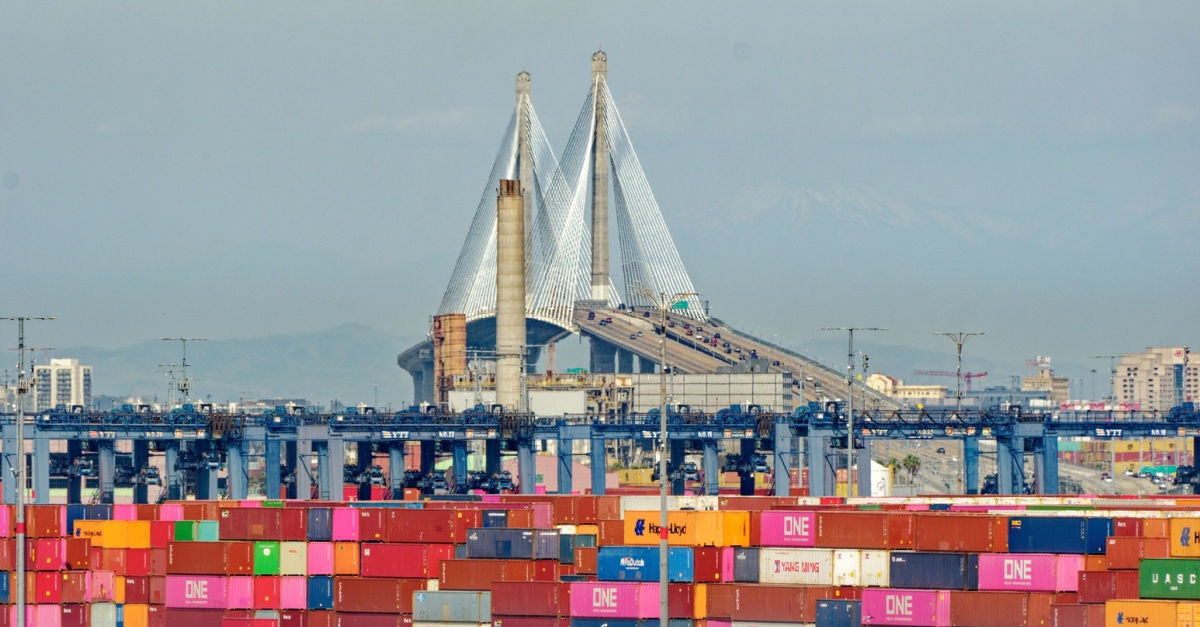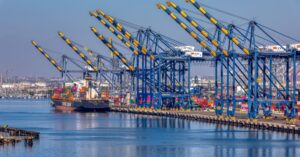In July, the logistics landscape saw significant shifts and challenges, reflecting the dynamic nature of global trade and transportation. U.S. West Coast ports experienced a robust surge in container volumes, driven by early peak season activities and strong consumer spending. The Truck Safety Coalition (TSC) criticized the U.S. Department of Transportation (DOT) for delays in crucial safety regulations, while the trucking industry faced a net loss of carriers despite a slowing rate of exits. Potential labor strikes at East and Gulf Coast ports threaten to disrupt operations as we head deeper into the third quarter of 2024.
Continue reading to learn more about what is happening across the freight market.
West Coast Ports Experience Surge in Container Volumes
The California ports of Los Angeles, Long Beach, and Oakland experienced a surge in trade activity in the first half of 2024.
The surge is attributed to the early peak season driven by concerns about tariffs, potential labor strikes at East and Gulf Coast ports, and strong consumer spending due to higher wages and a robust job market. Here are some of the numbers:
- The Port of Los Angeles handled 4.7 million twenty-foot equivalent units (TEUs) in the first half of 2024, 14.4% more than the same period last year.
- The Port of Long Beach posted its strongest total volume for June on record and the highest reading for inbound containers since mid-2022, as total container volumes increased 15% in the first half of 2024 compared with last year.
- The Port of Oakland reached its highest monthly total since August 2022, with 84,040 TEUs of imports in June, a 26.8% increase compared to last year.
Executives for the ports of LA and Long Beach predict continued growth in the second half of the year.
Port of Singapore Congestion Raising Spot Market Prices
According to an AlixPartners report, congestion at the second-busiest port globally, the Port of Singapore, has significantly increased in recent months.
The congestion has caused substantial delays for trade vessels and driven up spot market prices for ocean shipping. Vessels now have to wait up to a week before they can berth, in stark contrast to January, when it only took about half a day. To avoid the long wait times, some ships divert to nearby ports, but the volume has also created congestion at these ports. While the demand for ocean shipping remains relatively steady, the supply constraints due to congestion have increased spot prices.
Moreover, the report underscores the profound influence of U.S.-China tariffs on trade flows. While the total value of U.S. imports has surged, imports from China have fallen, leading to a significant rise in exports to the U.S. from countries such as Vietnam, Mexico, and India.
Truck Safety Coalition Has Beef with the DOT
The TSC has expressed frustration and disappointment with the DOT in a letter sent to the transportation secretary. The coalition claims the DOT is repeatedly delaying crucial safety rulemaking.
With the rules in place, especially those for heavy vehicle speed limiters and automatic emergency braking, truck crash fatalities are forecast to reduce significantly. However, the TSC believes that the DOT is not taking this seriously, and the department has no sense of urgency. This inaction, it argues, has resulted in preventable deaths and a lack of accountability for victims and survivors.
Additionally, the TSC highlighted the issue of trucking companies failing to utilize the Federal Motor Carrier Safety Administration’s (FMCSA) Drug & Alcohol Clearinghouse. In response to the criticism, the FMCSA stated that the published rulemaking dates are estimates and can change due to various factors, including additional research and stakeholder engagement. Still, the TSC is not buying it, claiming the delays have real-world consequences.
To bolster its point, the coalition cited a fatal six-vehicle crash in June that it said could have been prevented if a rule ensuring new drivers’ safety knowledge had been implemented sooner.
Capacity Contraction Slows in Q2 But Still Highly Negative
The trucking industry continues to experience a net loss of businesses in the second quarter of 2024.
According to FMCSA data, the industry is still losing more carriers than those entering it. Although the rate of exits slowed from April to June, the overall trend still indicates a decline in the carrier population. Experts predict favorable conditions for the trucking industry, but they don’t expect those to consistently take hold until 2025, although some improvement might be seen in the fourth quarter of 2024. Some analysts note that FMCSA data may not fully reflect the number of entities leaving or entering the market. Other data sources suggest a decline in the average number of employees per trucking establishment despite increased business locations during the pandemic.
Overall, it is clear that the attrition rate is slowing down, but the overall trend remains negative.
Port Strike Threats Growing Louder
The U.S. is currently under the looming threat of potential disruptions at major East Coast and Gulf Coast seaports.
This results from a tense standoff between dockworkers represented by the International Longshoremen’s Association (ILA) and the United States Maritime Alliance. The urgency of the situation is underscored by the fact that negotiations for a new labor contract have stalled, with the current contract set to expire Sept. 30. The ILA, led by Harold Daggett, demands a significant pay raise and strongly opposes port automation. In June, the union abruptly withdrew from talks over a dispute regarding using automated equipment at the Port of Mobile in Alabama.
While shipping executives initially viewed the strike threats as a negotiating tactic, there is growing concern that a strike could occur in October, coinciding with the peak shipping season for holiday goods.
Transportation Never Sleeps With COGISTICS
At COGISTICS Transportation, we’re not just the average logistics provider in the market; we transform logistics challenges from air, land, and ocean into strategic advantages around the clock and worldwide. Whether consolidating shipments or pushing expedited freight, you can trust COGISTICS Transportation to have your back. Leveraging over 30 years of expertise, we provide innovative, technology-driven logistics solutions by land, air, and sea — around the clock, around the world. Get in touch with us today.




